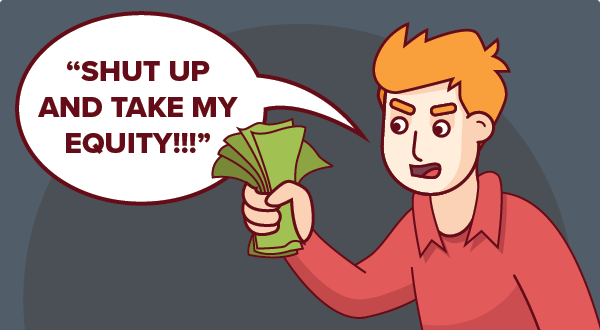Wil Schroter

Getting equity back from an existing stakeholder isn't easy — but it is possible.
It's a situation that very few Founders have ever been through before, so no one really knows how to go about it. Let's talk a bit about how the situation develops and what we can do to get some of that precious equity back into our coffers.
Remember, Equity is a Promise of Payment
More than anything, equity isn't just a stock issuance. It's a promise that at some future point that stock will be worth cash money — maybe.
When we think about pulling the equity back, we have to think in terms of how to redeem that promise of payment in some capacity. It's not just a matter of "taking it away" per se, it's a matter of trading the terms of the initial agreement with new terms that work for both parties.
Convert to Cash Over Time
The easiest way to approach this is to work out a way to convert the equity into some sort of cash equivalent, paid out over a set period of time.
We're going to assume we don't have a bunch of payout money sitting in the bank somewhere (why would we?) so we're going to need to use time as a factor for payout. This could be a period of 1-4 years, depending on what feels reasonable to both parties.
Remember that "Plan B" for our departed equity holder is $0, so a cash payout for a liquid stock is super rare.
Create a Payout Aligned with Growth
It may be the case that both parties have a hard time agreeing on price (what a shocker) so we need to develop a more dynamic approach to payout.
One solution could be to pay out on a scaling basis, based on the performance of the business each year. We could tie that payout to net income (to protect against paying in a profit-losing mode) or on gross sales (so that we can forecast the payout as part of our "cost of goods sold," so to speak).
Getting Paid Now Equals Taking a Discount
Regardless of how we structure the payment, the receiving party has to understand that getting paid out early and before any liquidity is assured comes at a steep discount.
The cash payment has more to do with the value of cash, not necessarily the value of the company. Yes, the company might be worth $50 million, but that 5% stake isn't going to yield a $2.5 million payout because it's not liquid whatsoever.
Instead, we may settle on a $250K payout over 4 years. If the recipient feels like that's leaving opportunity on the table, we can split the payout to pay $250K for 4% of the stock and leave the 1% as remaining equity "just in case."
In Case You Missed It
What’s a Cap Table and Why Should I Care? As we're wading into the waters of our first startup, especially when we start talking to investors, we're going to get asked about our "cap table" — a lot. For many of us who have no idea what that means, here's a quick primer.
Should I Pay People With Equity? (podcast). Paying people with equity is a time-honored tradition in cash-starved startup land. However, have you ever stopped to consider the real cost? Join Wil and Ryan as they break it down.
Startup Equity 101: Who Gets What Slice of the Pie? If you’re starting to freak out a bit about who gets what slice of your startup pie, take a deep breath, calm down, and get ready for Startup Equity 101.
Find this article helpful?
This is just a small sample! Register to unlock our in-depth courses, hundreds of video courses, and a library of playbooks and articles to grow your startup fast. Let us Let us show you!
Submission confirms agreement to our Terms of Service and Privacy Policy.
Already a member? Login
No comments yet.
Register to join the discussion.
Already a member? Login
